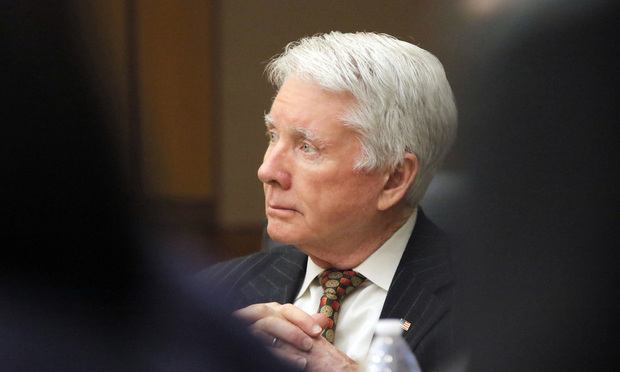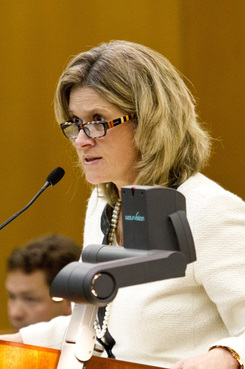Diane McIver's Estate Can Sue Husband Tex McIver for Her Wrongful Death
The Georgia Court of Appeals upheld the trial court's refusal to dismiss a wrongful death case brought against Atlanta attorney Tex McIver by his wife's estate and affirmed that the estate administrator has standing to sue.
October 24, 2019 at 06:09 PM
5 minute read
 Claud "Tex" McIver listens to discussion about the jury's trip to the basement to see McIvers' Ford Expedition where the shooting took place during his trial, April 16, 2018, in Atlanta. McIver faces charges including murder in the September 2016 death of his wife, Diane McIver. (Bob Andres/Atlanta Journal-Constitution via AP, Pool)
Claud "Tex" McIver listens to discussion about the jury's trip to the basement to see McIvers' Ford Expedition where the shooting took place during his trial, April 16, 2018, in Atlanta. McIver faces charges including murder in the September 2016 death of his wife, Diane McIver. (Bob Andres/Atlanta Journal-Constitution via AP, Pool)
The estate of Atlanta attorney Claud "Tex" McIver's murdered wife can sue McIver over her wrongful death, the Georgia Court of Appeals ruled Wednesday.
The decision, written by Judge Sara Doyle, affirms a ruling by a DeKalb County state court judge who last year denied McIver's motion to dismiss the suit. The suit was brought on behalf of Diane McIver's estate by court-appointed administrator Mary Margaret Oliver.
While affirming the trial court's refusal to dismiss the estate's claims against Tex McIver—a former Fisher & Phillips partner who was convicted of shooting his wife to death last year—the appeals panel directed the trial judge to vacate the order and transfer the case to DeKalb Superior Court. McIver is currently serving a 30-year prison sentence for felony murder.
In doing so, Doyle cited cases holding it is "within the equitable powers of the superior court" to permit the pursuit of a wrongful death claim by a party other than a surviving spouse who is also the perpetrator.
The civil case against McIver by his dead wife's estate is the first time in Georgia that a wrongful death action has been filed by the victim's estate against the victim's spouse. Oliver sued McIver after the lawyer was charged with his wife's murder and removed as executor of her estate. Oliver was appointed by the probate court to replace him. Diane McIver has no surviving children or family.
The estate suit holds that Tex McIver is liable for his wife's wrongful death because he shot her from the backseat of their SUV as Dani Jo Carter, a family friend, was driving them home from a weekend at their Putnam County ranch. Carter is also named as a defendant in the wrongful death suit but didn't join McIver in appealing the trial court order. Lee Davis, Carter's attorney, has said the claim against Carter has no merit and that she did nothing wrong.
Atlanta attorney Robin Frazer Clark, who represents Oliver and Diane McIver's estate, said Wednesday's appellate decision "falls in line with the state of Georgia's very strong policy that when someone is wrongfully killed in the state of Georgia, there will be a recovery against the wrongdoer."
 Robin Frazer Clark. Photo: John Disney/Daily Report
Robin Frazer Clark. Photo: John Disney/Daily Report"Had they not ruled like this, no one would have been able to recover for the death of Diane," she said.
And, she added, state policy holds that "wrongdoers are not going to be allowed to profit from their own wrongdoing."
The opinion "shows a strict construction of the statutes that apply, and that they are construed together," she explained. "I'm pretty comfortable they got it right."
Clark said she intends to start trying the case in DeKalb County Superior Court where she predicted it would pick up right where it left off in state court. "The Court of Appeals makes it clear their opinion is the law of the case," she said. "The law of case is that Mary Margaret Oliver is a proper party."
Tex McIver's attorney, James Scarbrough of Atlanta's Mabry & McClelland, contended during oral arguments in May that as the surviving spouse, McIver—not his wife's estate—has authority to bring a wrongful death claim for her death. Scarbrough couldn't be reached.
"But this ignores the fact that McIver himself caused Diane's death, and although the law contemplates that there should be a right of recovery, it does not authorize a surviving spouse to benefit from his own wrong," Doyle wrote for an appeals panel that included Judges Clyde Reese and Todd Markle.
"The question is not the plain language of the statute … but whether McIver should be deemed a surviving spouse so as to hold the right of action for the wrongful death," Doyle wrote. "And the answer to this question must be 'no.'"
She noted in her opinion that state law allows an executor or an estate administrator to bring a wrongful death action if there is no one else entitled to do so.
Doyle also said the legislature "did not intend that a murdering spouse financially benefit from the murder by possessing the ability to pursue the right of action for the victim's death against any other parties potentially liable for the homicide."
This content has been archived. It is available through our partners, LexisNexis® and Bloomberg Law.
To view this content, please continue to their sites.
Not a Lexis Subscriber?
Subscribe Now
Not a Bloomberg Law Subscriber?
Subscribe Now
NOT FOR REPRINT
© 2025 ALM Global, LLC, All Rights Reserved. Request academic re-use from www.copyright.com. All other uses, submit a request to [email protected]. For more information visit Asset & Logo Licensing.
You Might Like
View All
12-Partner Team 'Surprises' Atlanta Firm’s Leaders With Exit to Launch New Reed Smith Office
4 minute read
After Breakaway From FisherBroyles, Pierson Ferdinand Bills $75M in First Year
5 minute read
On the Move: Freeman Mathis & Gary Adds Florida Partners, Employment Pro Joins Jackson Lewis
6 minute read
Veteran Litigators Move From Sidley Austin to Alston & Bird's New Chicago Office
3 minute readTrending Stories
- 1Reviewing Judge Merchan's Unconditional Discharge
- 2With New Civil Jury Selection Rule, Litigants Should Carefully Weigh Waiver Risks
- 3Young Lawyers Become Old(er) Lawyers
- 4Caught In the In Between: A Legal Roadmap for the Sandwich Generation
- 5Top 10 Developments, Lessons, and Reminders of 2024
Who Got The Work
J. Brugh Lower of Gibbons has entered an appearance for industrial equipment supplier Devco Corporation in a pending trademark infringement lawsuit. The suit, accusing the defendant of selling knock-off Graco products, was filed Dec. 18 in New Jersey District Court by Rivkin Radler on behalf of Graco Inc. and Graco Minnesota. The case, assigned to U.S. District Judge Zahid N. Quraishi, is 3:24-cv-11294, Graco Inc. et al v. Devco Corporation.
Who Got The Work
Rebecca Maller-Stein and Kent A. Yalowitz of Arnold & Porter Kaye Scholer have entered their appearances for Hanaco Venture Capital and its executives, Lior Prosor and David Frankel, in a pending securities lawsuit. The action, filed on Dec. 24 in New York Southern District Court by Zell, Aron & Co. on behalf of Goldeneye Advisors, accuses the defendants of negligently and fraudulently managing the plaintiff's $1 million investment. The case, assigned to U.S. District Judge Vernon S. Broderick, is 1:24-cv-09918, Goldeneye Advisors, LLC v. Hanaco Venture Capital, Ltd. et al.
Who Got The Work
Attorneys from A&O Shearman has stepped in as defense counsel for Toronto-Dominion Bank and other defendants in a pending securities class action. The suit, filed Dec. 11 in New York Southern District Court by Bleichmar Fonti & Auld, accuses the defendants of concealing the bank's 'pervasive' deficiencies in regards to its compliance with the Bank Secrecy Act and the quality of its anti-money laundering controls. The case, assigned to U.S. District Judge Arun Subramanian, is 1:24-cv-09445, Gonzalez v. The Toronto-Dominion Bank et al.
Who Got The Work
Crown Castle International, a Pennsylvania company providing shared communications infrastructure, has turned to Luke D. Wolf of Gordon Rees Scully Mansukhani to fend off a pending breach-of-contract lawsuit. The court action, filed Nov. 25 in Michigan Eastern District Court by Hooper Hathaway PC on behalf of The Town Residences LLC, accuses Crown Castle of failing to transfer approximately $30,000 in utility payments from T-Mobile in breach of a roof-top lease and assignment agreement. The case, assigned to U.S. District Judge Susan K. Declercq, is 2:24-cv-13131, The Town Residences LLC v. T-Mobile US, Inc. et al.
Who Got The Work
Wilfred P. Coronato and Daniel M. Schwartz of McCarter & English have stepped in as defense counsel to Electrolux Home Products Inc. in a pending product liability lawsuit. The court action, filed Nov. 26 in New York Eastern District Court by Poulos Lopiccolo PC and Nagel Rice LLP on behalf of David Stern, alleges that the defendant's refrigerators’ drawers and shelving repeatedly break and fall apart within months after purchase. The case, assigned to U.S. District Judge Joan M. Azrack, is 2:24-cv-08204, Stern v. Electrolux Home Products, Inc.
Featured Firms
Law Offices of Gary Martin Hays & Associates, P.C.
(470) 294-1674
Law Offices of Mark E. Salomone
(857) 444-6468
Smith & Hassler
(713) 739-1250






